In October 2006 a programme to promote the work of the GICHD within French-speaking countries affected by mines and ERW was created. The programme was handed over to the African partners in December 2011, in particular to the Centre de Perfectionnement aux Actions Post Conflictuelles de Déminage et de Dépollution (CPADD).
This programme had three key aims, to:
- Strengthen the role of the GICHD in French-speaking mine-affected countries
- Promote the French language in mine action
- Increase exchange, in particular between French-speaking and English-speaking mine action communities
To promote these aims, the French-language Programme:
- Published and translated important documents for the Francophone mine and ERW action community in collaboration with The Humanitarian Demining Training Centre of Benin (CPADD) and the French Army Engineers and Demining Specialists Advanced Course (ESAG)
- In partnership with three African centres created the online library website Bibliomines, which collects all French documentation and events on mine and ERW action that exist
- Organised annual seminars of African Francophone actors engaged in humanitarian action against mines and ERW on their national territories as a platform for the exchange of expertise and information
- Identified and promoted Francophone expertise internationally
Bibliomines
The Bibliomines online library collects and makes available existing documentation in French on mines and ERW action to benefit French-speaking communities affected by mines and ERW and national actors of mine action.
Four organisations work in partnership to implement this project:
- Humanitarian Demining Training Centre (CPADD) of Benin
- Senegalese National Mine Action Centre (CNAMS)
- National Programme for Humanitarian Demining for Development (PNDHD) of Mauritania
- GICHD
Bibliomines is supported financially by the Organisation Internationale de la Francophonie (OIF), Switzerland and France.
The documents listed, collated and collected on the Bibliomines website are of various natures and origins:
- Documents from mine-affected countries
- Documents from international institutions
- Conventions and texts of international law
- Documents developed for national implementation (legislations, strategies, national standards, procedures, programmes, etc.)
- Studies, surveys, publications etc.
Bibliomines also promotes the production and dissemination of new documents and creates opportunities for exchanging expertise.
"EVENEMENTIEL" is a special feature showing events on mine action in the Francophone world which have just happened or which are scheduled (meetings, trainings, AOB).
The page "EMPLOIS" aims to offer an additional tool to organisations which are interested in placing their job adverstisements, as well as a useful space for research by Francophone experts.
Francophone seminars
The GICHD, in collaboration with its partners in Africa, organised yearly seminars for Francophone national actors involved in mine and ERW action.
These seminars have four key objectives, to:
- Mobilise Francophone national actors for the effective implementation of instruments of international humanitarian law, in particular the Anti-personnel Mine Ban Convention, the Convention on Cluster Munitions, Amended Protocol II and Protocol V of the Convention on Certain Conventional Weapons
- Bring together the national actors and French-speaking experts from international organisations and NGOs
- Improve these actors’ capacities to establish and implement effective and coherent programmes on mines and ERW within appropriate national structures, and to integrate these activities into their countries’ development policies
- Promote exchange and cooperation between actors in Francophone mine-affected countries and support the emergence of Francophone centres of expertise on the international scene
Benin 2008 seminar report [PDF]
Senegal 2009 seminar report [PDF]
FRCP Publications
Le transfert de responsabilités des terres remises à disposition | Procédures communes et bonnes pratiques
Ce rapport est basé sur les résultats d'études de cas dans huit pays. La recherche a été menée par GMAP et le CIDHG.Il inclut des procédures de remise des terres, des directives et des normes. Il rassemble également les bonnes...
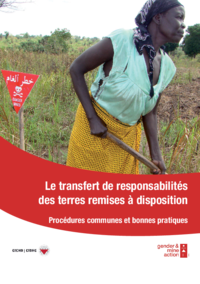
- Available in French
Recrutement et formation sensibles au genre dans l’action contre les mines - Directives
Ces directives ont été élaborées pour aider les Autorités nationales de l’action antimines (ANAM), les organisations nongouvernementales (ONG), les agences des Nations Unies, les organisations nationales, les sociétés commerciales...
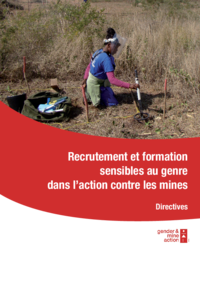
- Available in French
Action contre les mines et réduction de la violence armée
Le présent document d’orientation repose sur les résultats d’une étude entreprise par le Centre internationalde déminage humanitaire de Genève (CIDHG) en 2011-2012 sur le rôle des organisations d’action contreles mines en appui à...
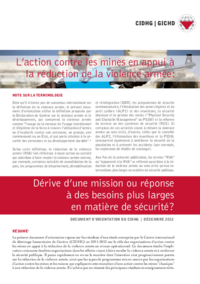
- Available in French
Les documents adoptés lors du Sommet du Carthagène
Le plan d'action de Carthagène et la Déclaration de Carthagène

- Available in French
Guide de la passation de marchés dans l'action contre les mines
Ce guide vise à éclairer les directeurs nationaux, les programmes d’action contre les mines, ainsi que d’autres organisations actives dans l’action contre les mines, sur les divers aspects de la passation de marchés dans l’action...
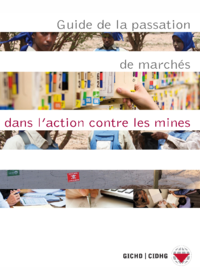
- Available in French
Guide sur les armes à sous-munitions | Deuxième édition
La Convention sur les armes à sous-munitions représente une avancée majeure dans les efforts internationaux déployés pour protéger les civils des effets des armes à sous munitions, ainsi que pour répondre à leurs besoins...
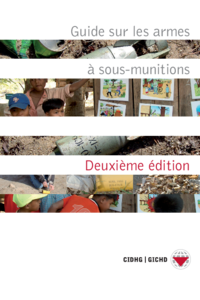
- Available in French
Displaying results 11 to 16 out of 16
- « Previous
- 1
- 2
Arab Regional Cooperation Programme (ARCP)
The purpose is to improve knowledge, exchange experiences and promote best mine action practices throughout the Arabic-speaking world.
Eastern Europe, Caucasus and Central Asia regional cooperation programme (EECCA RCP)
The purpose is to assist national authorities and their staff members to build capacities in relevant areas by giving access to material, training and advisory services in the Eastern Europe, Caucasus and Central Asia (EECCA) region.
